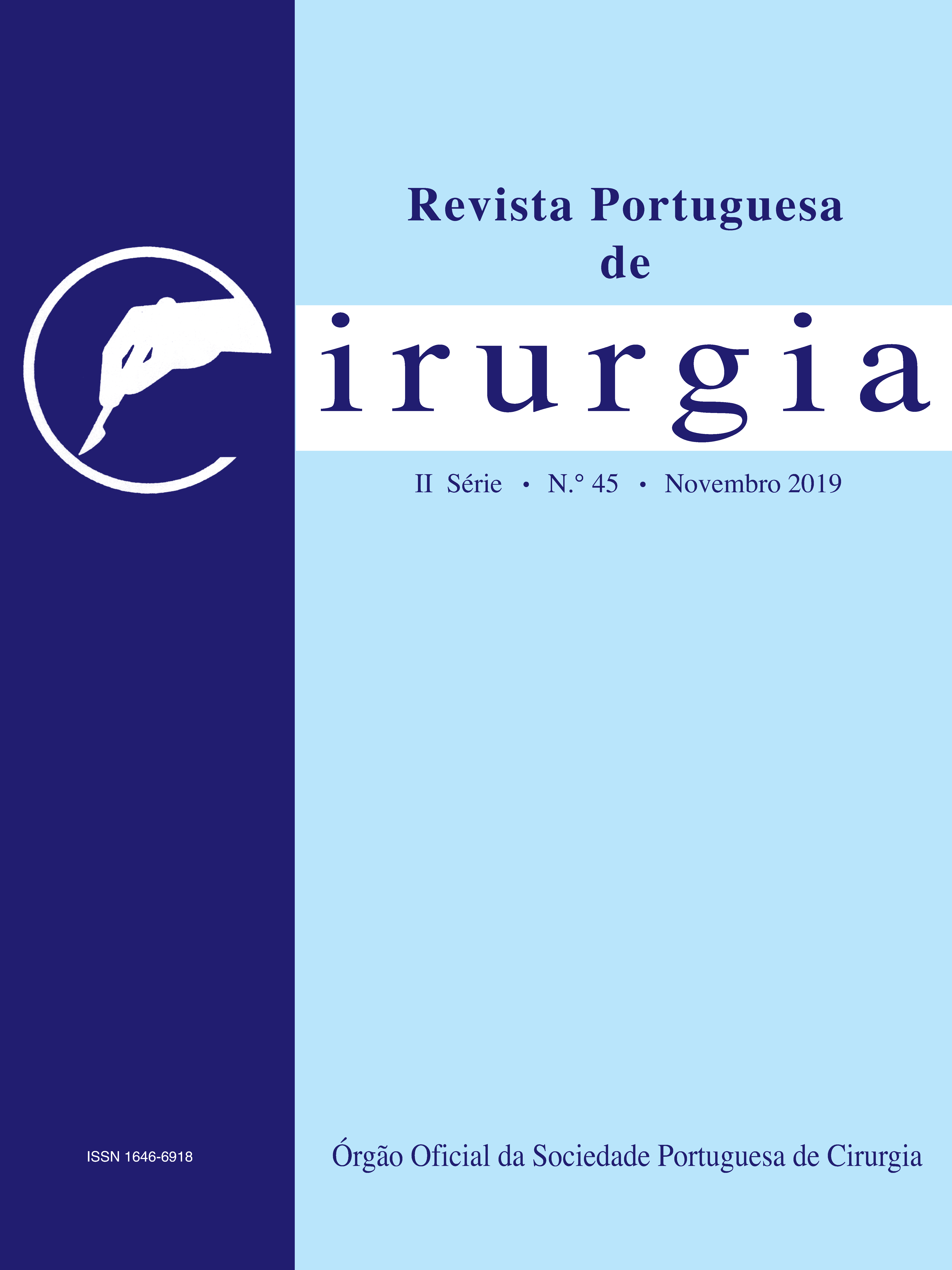Hérnia de Littré – a propósito de um caso clínico de um divertículo de Meckel numa hérnia femoral estrangulada
Keywords:
hernia de Littré, divertículo de Meckel, hérnia femoral, hérnia estranguladaAbstract
Introdução: O divertículo de Meckel é a anomalia gastrointestinal congénita mais comum e resulta da obliteração incompleta do ducto vitelino. A hérnia de Littré define-se pela presença de um divertículo de Meckel no saco herniário. O estrangulamento do divertículo de Meckel numa hérnia femoral é uma entidade extremamente rara que requer correção cirúrgica imediata.
Caso Clínico: Reportamos o caso clínico de uma mulher de 18 anos que recorreu ao serviço de urgência por uma hérnia femoral dolorosa e encarcerada à esquerda, sem sinais ou sintomas de obstrução intestinal associados. Durante a intervenção cirúrgica, aquando da abertura do saco herniário, foi identificado um divertículo de Meckel, procedendo-se então a diverticulectomia. A ansa de intestino delgado não se encontrava herniada nem tinha sinais de isquemia, pelo que não foi necessário realizar uma enterectomia. O defeito herniário foi subsequentemente corrigido através da técnica de Lichtenstein modificada.
Discussão: A sintomatologia de um divertículo de Meckel complicado é inespecífica e dependente do tipo de complicação. O diagnóstico de hérnia de Littré é exigente e difícil de estabelecer durante o pré-operatório, uma vez que a sua apresentação clínica é ambígua e a imagiologia tem um papel limitado. Quando a obstrução do intestino delgado é provocada por um divertículo de Meckel complicado, a intervenção cirúrgica tem como objetivo principal remover o divertículo e corrigir a patologia associada, independentemente da abordagem utilizada ser laparoscópica ou cirurgia aberta.
Conclusão: No caso de uma hérnia de Littré estrangulada o tratamento é baseado na condição clínica do doente e na experiência do cirurgião. Não obstante, o tratamento requer, pelo menos, uma ressecção completa do divertículo para evitar complicações futuras.
Downloads
References
2. Malik AA, Shams-ul-Bari, Wani KA, Khaja AR (2010) Meckel’s Diverticulum – Revisited. Saudi J Gastroenterol 16 (1): 3-7. Doi: 10.4103/1319-3767.58760
3. Misiak P, Piskor L, Katrin L, Jabłoński S, Kordiak J, Brockley M (2014) Strangulation of a Meckel’s diverticulum in a femoral hernia (Littré’s hernia). Prz Gastroenterol 9 (3): 172-174. doi: 10.5114/pga. 2014.43580
4. Johns TNP, Wheeler JR, Johns FS (1959) Meckel’s Diverticulum and Meckel’s Diverticulum Disease: A Study of 154 cases. Ann Surg 150 (2): 241-256.
5. Sharma RK, Jain VK (2008) Emergency surgery for Meckel’s diverticulum. World J Emerg Surg 3: 27. doi 10.1186/1749-7922-3-27
6. Stănescu GL, Pleşea IE, Diaconu R, Gheonea C, Sabetay C, Tîştea D, Niculescu EC (2014) Meckel's diverticulum in children, clinical and pathological aspects. Rom J Morphol Embryol, 55 (3 Suppl):1167-70.
7. Magagi IA, Adamou H, Habou O (2016) A case of Littré’s hernia at Zinder National Hospital, Zinder, Niger. J West Afr Coll Surg 6 (2): 125-130.
8. Malling B, Karlsen AA, Hern J (2017) Littre Hernia: A Rare Case of an Incarcerated Meckel’s Diverticulum. Ultrasound Int Open 3 (2): E91-92. doi: 10.1055/s-0043-102179
9. Payson BA, Schneider KM, Victor MB (1956) Strangulation of a Meckel’s Diverticulum in a Femoral Hernia (Littré’s). Ann Surg 144 (2): 277-281.
10. Smart N, Immanuel A, Mercer-Jones M (2007) Laparoscopic repair of a Littré’s hernia with porcine dermal collagen implant (Permacol). Hernia 11: 373-376. doi: 10.1007/s10029-007-0197-4
11. Horkoff MJ, Smyth NG, Hunter JM (2014) A large incarcerated Meckel’s diverticulum in an inguinal hernia. Int J Surg Case Rep. 5(12): 899-901. doi: 10.1016/j.ijscr.2014.09.036
12. Chan KW, Lee KH, Mou JWC, Cheung ST, Tam YH (2008) The use of laparoscopy in the management of Littré’s hernia in children. Pediatr Surg Int 24: 855-858. doi: 10.1007/s00383-008-2161-5
Downloads
Published
Issue
Section
License
Para permitir ao editor a disseminação do trabalho do(s) autor(es) na sua máxima extensão, o(s) autor(es) deverá(ão) assinar uma Declaração de Cedência dos Direitos de Propriedade (Copyright). O acordo de transferência, (Transfer Agreement), transfere a propriedade do artigo do(s) autor(es) para a Sociedade Portuguesa de Cirurgia.
Se o artigo contiver extractos (incluindo ilustrações) de, ou for baseado no todo ou em parte em outros trabalhos com copyright (incluindo, para evitar dúvidas, material de fontes online ou de intranet), o(s) autor(es) tem(êm) de obter, dos proprietários dos respectivos copyrights, autorização escrita para reprodução desses extractos do(s) artigo(s) em todos os territórios e edições e em todos os meios de expressão e línguas. Todas os formulários de autorização devem ser fornecidos aos editores quando da entrega do artigo.



